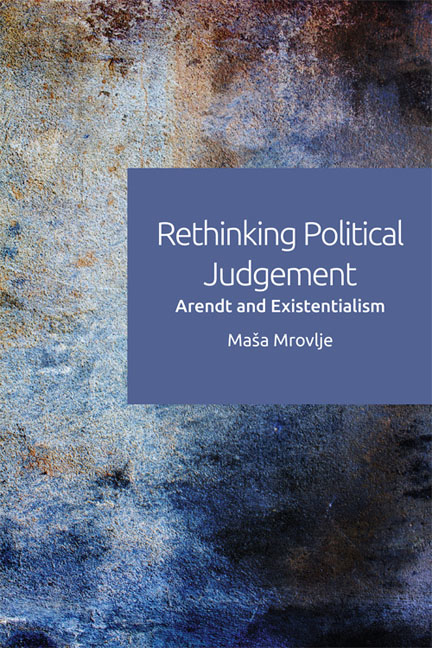Book contents
- Frontmatter
- Contents
- Acknowledgements
- Introduction
- 1 Political Judgement in the History of Political Thought and the Modern Crisis
- 2 Sartre and Beauvoir: The Ambiguity of Political Judgement and the Challenge of Freedom and Responsibility
- 3 Camus and Arendt: Confronting the Ambiguity of Political Judgement and Illuminating the Limits of the World
- 4 Political Judgement and Narrativity
- 5 Facing Up to the Tragedy of Political Action: The Problem of Dirty Hands
- 6 Times of Transition: Reconciling with the Tragic Nature of Political Affairs
- Conclusion: Reclaiming Wonder at the World of Political Affairs
- Bibliography
- Index
1 - Political Judgement in the History of Political Thought and the Modern Crisis
- Frontmatter
- Contents
- Acknowledgements
- Introduction
- 1 Political Judgement in the History of Political Thought and the Modern Crisis
- 2 Sartre and Beauvoir: The Ambiguity of Political Judgement and the Challenge of Freedom and Responsibility
- 3 Camus and Arendt: Confronting the Ambiguity of Political Judgement and Illuminating the Limits of the World
- 4 Political Judgement and Narrativity
- 5 Facing Up to the Tragedy of Political Action: The Problem of Dirty Hands
- 6 Times of Transition: Reconciling with the Tragic Nature of Political Affairs
- Conclusion: Reclaiming Wonder at the World of Political Affairs
- Bibliography
- Index
Summary
Despite the traditional focus on constructing abstract and universal standards of morality, the problematic of judgement makes persistent appearance in the history of political thought. While the enquiry into the concept has generally not been systematic, it figures in a plethora of thinkers who elevate judgement, and the corollary notions of choice, deliberation and practical reason, into one of the most pressing issues of ethics and politics. If the relevance of political judgement has commonly been submerged under prefabricated standards of thought, it is these attempts to delve into the judging ability itself, to scrutinise its proper and perhaps previously unquestioned ‘grounds’, that bring forward its distinct political nature. The purpose of this chapter then is not to determine what judgement is, but to disclose the role awarded to judgement in the political realm. It is an enquiry into the faculty of judgement as a distinctively political, deeply situated and relational affair, untangling a historical appreciation of how judgement crystallises the main dilemmas of individuals’ communal existence.
The chapter tells the story of political judgement in the history of political thought against the background of the modern crisis. It traces in history the growing sense of the perplexity of political judgement, disclosing how varied difficulties specific to particular historical periods herald the acute awareness of the breakdown of reliable standards in modernity. Given its focus on judgement as a political ability, the chapter views these difficulties of political judgement through the lens of a broader philosophical problem inhering in the ambiguous relationship of the subject to the outside world and separate others. On the one hand, it discerns how the increasing awareness of the complexities of politics inspired sophisticated attempts to think judgement as a situated, worldly activity that cannot be reduced to rule-bound reasoning. It draws attention to how the recognition of the ambiguity of political judgement often inspired a turn to the realm of aesthetics as a valuable prism through which to account for the dilemmas of human worldly existence. On the other hand, the chapter discloses in the confrontation with the topic of judgement the persistence of the rationalist tendency to escape its complex character into the realm of abstract concepts. It points to how these inadequacies disregarded the free, plural and incalculable world of human affairs, and coalesced in the crisis of judgement in modernity.
- Type
- Chapter
- Information
- Rethinking Political JudgementArendt and Existentialism, pp. 22 - 50Publisher: Edinburgh University PressPrint publication year: 2017



